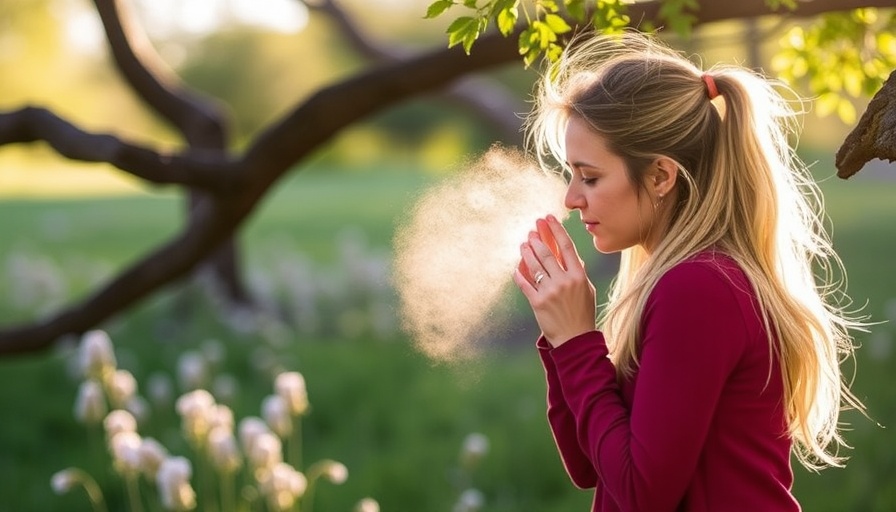
Why Allergy Seasons Are Increasingly Difficult in Sacramento
As spring ushers in blooming flowers and blossoming trees, Sacramento residents start to feel the unwelcome effects of the season: allergies.
The city, home to over 1.5 million residents, has seen increased pollen levels each year, ranking it as one of the worst cities in the U.S. for allergy sufferers.
Allergist Dr. Neil Parikh highlights that Sacramento's unique geography, combined with its climate and agricultural practices, creates fertile ground for pollen allergies.
"If you did not have allergies before moving to Sacramento, it’s not uncommon to develop them over time," he notes.
Understanding Sacramento's Allergy Season Patterns
Typically, Sacramento's allergy season begins in March and lasts through October, driven primarily by the pollen produced by various trees and grasses.
Early in the season, you can expect high pollen counts from alder, birch, and cottonwood trees.
Dr. Parikh explains that as spring progresses, different trees like mulberry and oak take over, transitioning into grass pollen dominance by the summer months.
What Lies Ahead in the 2025 Allergy Forecast?
According to AccuWeather’s annual allergy forecast for 2025, Sacramento is anticipated to experience an average pollen count, but that doesn’t guarantee relief.
Senior meteorologist Allan Reppert warns that even during an average season, spikes in pollen can occur during dry spells, leading to unexpected extreme allergy days.
Dr. Parikh notes a troubling trend: "Each year, unfortunately, seems to be a little bit worse than the previous year."
This statement highlights the growing concern among locals regarding how climate change and urban development may be contributing to worsening allergies.
The Increasing Dangers of Allergens
As pollen counts rise, so do the health risks associated with allergies. Seasonal allergies can lead to respiratory issues, impact overall well-being, and diminish quality of life.
Residents are often forced to adjust their routines to cope with the constant presence of pollen in the air.
Furthermore, the scare of high pollen counts brings out the best in local healthcare professionals, as many patients seek assistance to manage their symptoms.
A Local Community's Response to Allergies
Local leaders and community support groups are taking initiatives to address growing allergy concerns.
Engaging in environmental awareness campaigns is an important step towards educating residents about how to mitigate their exposure to allergens.
Community cooperation is vital in ensuring that strategies are put in place to preserve or enhance air quality.
These activities include planting native plants that can help decrease allergens and organizing neighborhood clean-ups to reduce mold and other allergenic substances from lingering in the environment.
Tips for Coping with Allergies During the Season
Stay Informed: Keep track of daily pollen forecasts and plan outdoor activities accordingly.
Limit Exposure: Try to remain indoors during peak pollen times, particularly in the early morning when pollen levels are highest.
Maintain Cleanliness: Regularly clean your living spaces to minimize dust and other allergens.
Consult Professionals: Discuss with healthcare providers about allergy medications or local immunologists for effective treatments.
As residents face what seems to be an increasingly difficult time managing seasonal allergies, it's crucial to remember the importance of staying proactive and involved in local initiatives aimed at improving overall environmental health.
By fostering community participation, Sacramento residents can come together to build a more sustainable and healthy future while finding ways to manage their allergy symptoms.
Getting Involved in Your Community
Community engagement is essential, especially as allergies become a more prevalent issue in Sacramento.
Join or establish local groups aimed at educating people about allergies and their connections to environmental health.
Whether it’s participating in tree planting events, neighborhood clean-ups, or attending workshops on managing allergies, every effort counts.
The way forward is not just about managing symptoms — it's about understanding the role our environment plays in creating these challenges.
Let's work together to create a healthier habitat for ourselves and future generations!
 Add Row
Add Row  Add
Add 





 Add Row
Add Row  Add
Add
Write A Comment